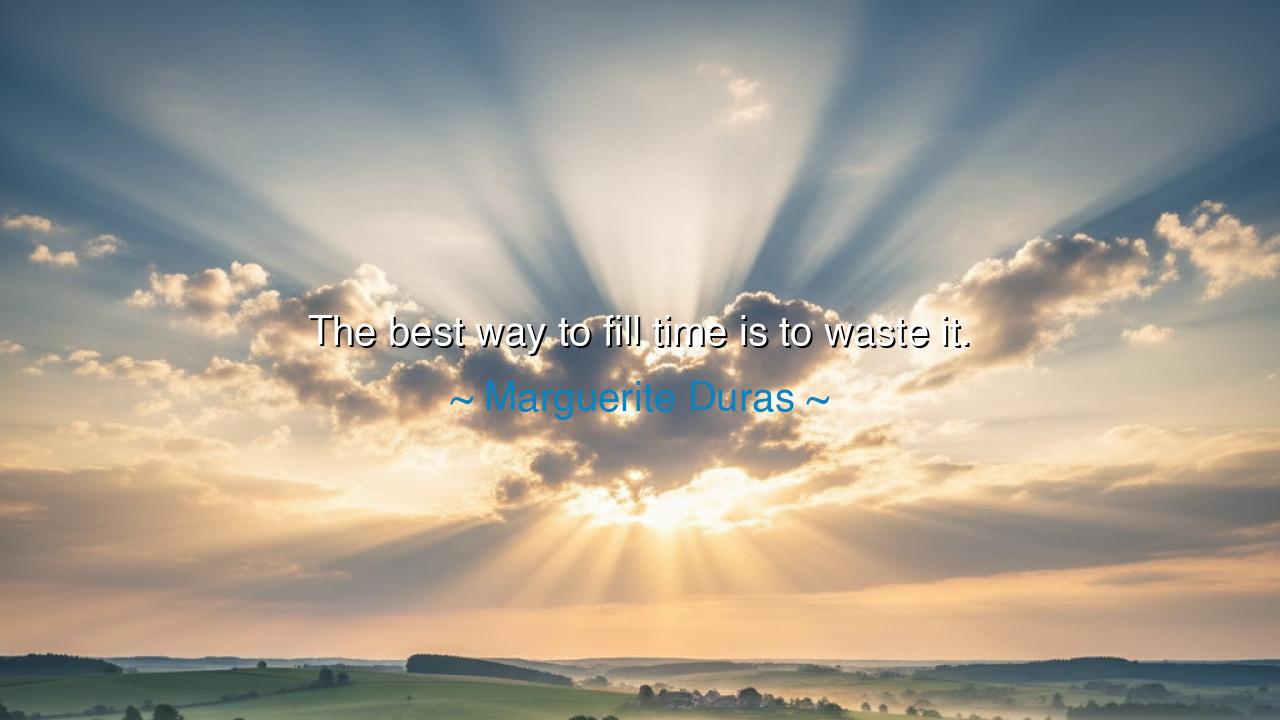
The best way to fill time is to waste it.






The French novelist and playwright Marguerite Duras, whose words often pierced the heart with paradox and beauty, once declared: “The best way to fill time is to waste it.” At first hearing, this seems like mockery of common sense. Do we not learn from childhood to be industrious, to spend our time wisely, to avoid waste as one avoids poverty? Yet Duras, with the wisdom of one who had lived through war, loss, and passion, spoke a deeper truth: that time is not always best filled with striving, but with being. Sometimes to “waste” time is to live most fully.
The origin of this saying lies in Duras’s philosophy of life and art. She was a writer who knew silence, leisure, and apparent idleness were not enemies, but companions of creation. To her, “wasting time” meant allowing the soul to wander, to breathe, to dream. In a world that constantly commands us to do, to achieve, to hurry, she lifted her voice to remind us that meaning often arises not in relentless labor, but in those quiet, unmeasured hours we dare to call wasted.
The ancients themselves saw glimpses of this wisdom. The Greeks honored scholé, a word that means both leisure and learning. From it we take our word “school.” They believed true contemplation, the highest use of the mind, was possible only when one stepped away from the busyness of daily toil. Likewise, the Taoist sages of China taught the art of wu wei—“non-doing”—the power of allowing life to flow without force. What looks like wasting time to the restless eye is, to the wise, the soil in which clarity and inspiration grow.
History also offers proof. Consider Albert Einstein, who often spoke of his long walks and idle hours spent daydreaming. It was in these “wasted” moments that the seeds of relativity and cosmic vision took root. Or recall J. R. R. Tolkien, who filled hours with what seemed to others like idle invention of languages and myth. What some might call wasted time gave birth to worlds that would inspire millions. Thus we see Duras’s paradox unfold: the time most “wasted” by worldly standards may be the time most fruitful in the hidden chambers of the soul.
The meaning of her words is this: do not confuse busyness with fullness. A man may pack every hour with labor and yet feel empty, while another may sit by the sea in silence and leave filled with wonder. To waste time in joy, in stillness, in play, in love—this is not waste, but life itself. The rush to fill every moment with achievement blinds us to the truth that time is not a vessel to be stuffed, but a current to be experienced.
Therefore, the lesson is clear: embrace the so-called waste. Give yourself permission to be unhurried, to sit in quiet, to gaze at the sky without purpose. Do not measure every hour by its productivity, but by its humanity. Time “wasted” with friends in laughter, or in watching the stars, or in wandering through thought—these are not losses but treasures, the very substance of memory and meaning.
In practice, I counsel this: set aside hours that are not bound to work or duty. Protect moments of idleness as fiercely as you protect your labor. If you are weary, let yourself rest without guilt. If you are inspired, let yourself dream without aim. Waste time, not recklessly, but reverently—like pouring wine for joy rather than for thirst. In such moments, you will find your spirit replenished and your days made whole.
Thus, remember the paradox of Marguerite Duras: “The best way to fill time is to waste it.” The world will tell you to chase, to consume, to produce. But the wise know that fullness often comes not from conquering time, but from surrendering to it. Waste time well, and you will discover that in doing so, you have not wasted it at all—you have lived it.






AAdministratorAdministrator
Welcome, honored guests. Please leave a comment, we will respond soon